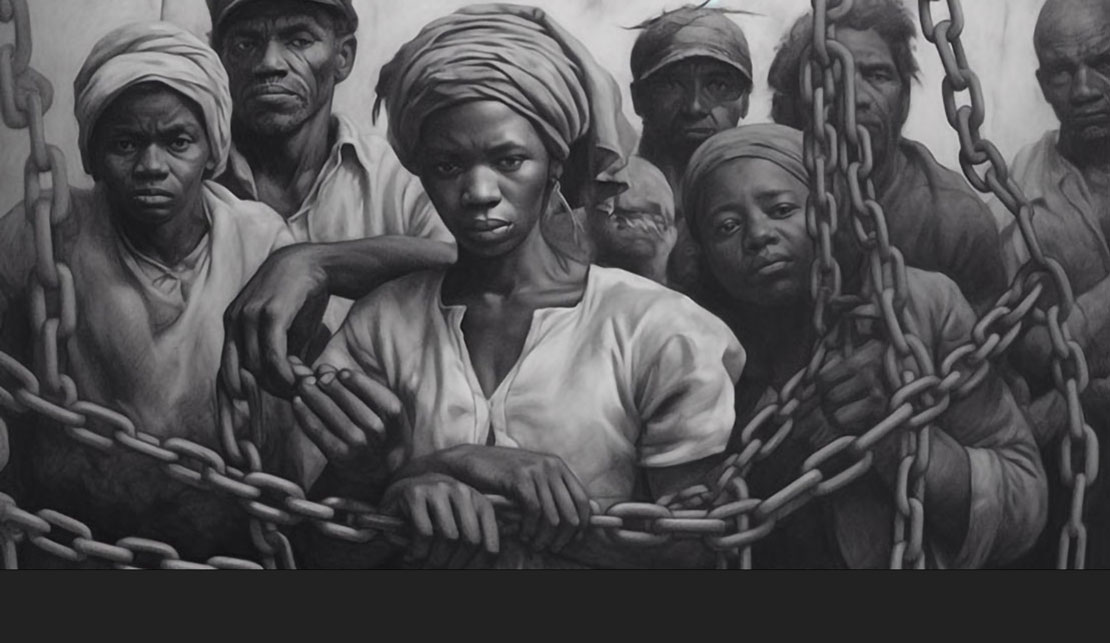DIASPORA | The Invisible Inheritance: How Slavery Syndrome and Cell Memory Shape the Daily Reality of Diaspora Africans

MONTEGO BAY, Jamaica, May 22, 2025 - Every morning, Marissa Thompson checks the locks on her apartment door three times before leaving for work in Brooklyn. She can't explain why, but the ritual feels necessary—a compulsion that seems to echo through her bones.
Across the Caribbean Sea in Kingston, Jamaica, Dr. Andrew Clarke finds himself hypervigilant in professional settings, second-guessing his expertise despite decades of medical training. In Atlanta, community organizer Jerome Williams speaks of a "heaviness" that settles on his chest during certain conversations about race, a weight that feels older than his 35 years.
These experiences, scattered across geography but united by ancestry, may share a common thread that scientists are only beginning to understand. According to emerging research on slavery syndrome and cellular memory, the trauma experienced by enslaved Africans centuries ago may continue to influence their descendants today through biological mechanisms that transcend individual experience.
The Science of Inherited Trauma
Dr. A.A. Avery's groundbreaking work on slavery syndrome describes a psychological condition affecting individuals and communities descended from those who experienced slavery and systemic oppression. The syndrome encompasses various mental health challenges, including internalized oppression, cultural disconnection, and a pervasive sense of vulnerability that seems to persist regardless of individual circumstances.
"What we're seeing is that trauma doesn't just affect the person who experiences it," explains Dr. Rachel Yehuda, a leading researcher in intergenerational trauma at Mount Sinai's Icahn School of Medicine. "Environmental factors, including severe stress and trauma, can create epigenetic changes that are passed down through generations."
Emerging research suggests that the trauma of slavery may be biologically embedded in the descendants of enslaved Africans, offering new insights into persistent challenges faced by Black communities across the Americas “
This concept of cellular memory suggests that cells retain information about past experiences, particularly traumatic ones.
The biological imprint of slavery—the chronic stress, hypervigilance, and survival mechanisms developed under conditions of extreme oppression—may be transmitted to descendants through epigenetic modifications that alter gene expression without changing the DNA sequence itself.
Daily Manifestations Across the Diaspora
In communities throughout the United States and Caribbean, these theoretical concepts translate into lived realities that shape daily existence in profound ways.
The Hypervigilance Trap
In Barbados, teacher Patricia Springer describes an exhausting state of constant alertness that she's carried since childhood. "I'm always scanning rooms, always aware of who's watching, always prepared for something to go wrong," she says.
"My grandmother was the same way, and her mother before her. We joke about having eyes in the back of our heads, but it's not really funny when you can never truly relax."
This hypervigilance, researchers suggest, may be a biological inheritance from ancestors who needed constant awareness to survive. The same neural pathways that kept enslaved people alive in dangerous situations may now manifest as chronic anxiety in their descendants.
The Achievement Paradox
Despite significant accomplishments, many successful African Americans and Caribbean professionals report feeling like imposters in their own success. Dr. Michelle Auguste, a Haitian-American surgeon in Miami, describes the phenomenon: "No matter how many degrees I earn or surgeries I perform successfully, there's this voice that whispers I don't belong here. It's as if my cells remember a time when excelling could be dangerous."
This internalized oppression, a key component of slavery syndrome, may stem from generations of ancestors who learned that standing out could mean punishment or death. The biological memory of these survival strategies may persist even when the external threats no longer exist.
 The Cultural Disconnection Dilemma
The Cultural Disconnection Dilemma
Many diaspora Africans struggle with a sense of rootlessness that seems disproportionate to their actual family histories. In Trinidad, artist Marcus Benjamin speaks of "ancestral homesickness"—a longing for something he's never known. "I feel displaced even in my own country," he says. "Like there's a part of me searching for home that was ripped away before I was even born."
This disconnection may be understood through the lens of cellular memory, where the trauma of cultural severing during the Middle Passage continues to reverberate through generations, creating a persistent sense of incompleteness.
The Weight of Intergenerational Trauma
The numbers tell a stark story. African Americans are twice as likely to develop anxiety disorders and experience higher rates of hypertension, diabetes, and other stress-related conditions. Caribbean nations report similar patterns of mental health challenges that seem disproportionate to current socioeconomic factors alone.
"We're looking at communities where trauma isn't just historical—it's cellular," says Dr. Joy DeGruy, author of "Post Traumatic Slave Syndrome." "When you understand that the stress responses developed during slavery may be biologically embedded in subsequent generations, you begin to see why traditional approaches to addressing inequality often fall short."
In Jamaica, social worker Claudette Morgan has observed these patterns in her community work. "You see families where depression seems to run deeper than genetics alone would explain," she notes. "There's a sadness that feels ancient, a fear that doesn't match the current reality but makes perfect sense when you consider what our ancestors endured."
Breaking the Cycle: Paths to Healing
Despite the weight of this invisible inheritance, researchers emphasize that understanding slavery syndrome and cellular memory offers hope rather than despair. Just as trauma can be transmitted across generations, so can resilience and healing.
Community-based approaches across the diaspora are showing promising results. In New Orleans, the African American Heritage Foundation has developed programs that combine traditional therapy with cultural reclamation practices. Participants report significant improvements in anxiety and depression after engaging with ancestral traditions and community healing circles.
"When people understand that their struggles have historical roots, it takes away the shame," explains program director Dr. Keisha Roberts. "Instead of feeling like personal failures, they begin to see themselves as carriers of both trauma and strength."
Similarly, in the Caribbean, traditional healing practices are being integrated with modern mental health approaches. In Barbados, the Sankofa Healing Center combines talk therapy with drumming, storytelling, and other cultural practices that help participants reconnect with positive aspects of their heritage.
The Biological Revolution in Understanding
Recent advances in epigenetics research are providing scientific validation for what many in African diaspora communities have long intuited. Studies of Holocaust survivors and their descendants have demonstrated that trauma can indeed be biologically transmitted, creating measurable changes in stress hormone regulation and immune function.
Dr. Yehuda's research team has identified specific epigenetic markers associated with trauma exposure that appear in subsequent generations. While research specific to slavery's impacts is still emerging, the biological mechanisms appear to be similar.
"We're at the beginning of understanding how historical trauma lives in the body," Dr. Yehuda explains. "But what's exciting is that epigenetic changes can be reversed. The same mechanisms that transmit trauma can potentially transmit healing."
Implications for Policy and Practice
These insights are beginning to influence approaches to healthcare, education, and social services in communities with large African diaspora populations. In Toronto, healthcare providers are being trained to recognize trauma responses that may stem from historical rather than personal experiences.
"When a patient presents with anxiety that seems disproportionate to their life circumstances, we now consider whether we're seeing the biological expression of ancestral trauma," says Dr. Aisha Griffith, who works with Caribbean immigrant communities. "This changes how we approach treatment completely."
Educational institutions are also beginning to incorporate these understandings. In Atlanta, some schools are piloting programs that teach African American students about the historical context of their families' experiences, helping them understand that certain challenges they face may be rooted in inherited trauma rather than personal inadequacy.
The Daily Navigation
For individuals navigating the complex intersection of historical trauma and contemporary life, understanding slavery syndrome and cellular memory offers both explanation and empowerment. The hypervigilance that exhausts may also be a gift of awareness.
The sensitivity to injustice that causes pain may also fuel advocacy. The sense of disconnection that creates longing may also inspire cultural reclamation.
Marissa Thompson, the Brooklyn resident who checks her locks each morning, has begun to understand her compulsions differently since learning about cellular memory. "I'm not crazy or paranoid," she reflects. "I'm carrying the wisdom of ancestors who knew that safety couldn't be taken for granted. Now I'm learning to honor that wisdom while also teaching my cells that I'm safe now."
Dr. Andrew Clarke in Kingston has started incorporating meditation and cultural practices into his routine, finding that connecting with his heritage helps quiet the hypervigilance that has long plagued him. "I'm learning to distinguish between the fears that serve me and the fears that were passed down to me," he says.
Looking Forward
As research into slavery syndrome and cellular memory continues to evolve, one thing becomes clear: the path to healing lies not just in individual therapy but in community recognition, cultural reclamation, and societal acknowledgment of the ongoing impacts of historical trauma.
The daily dilemmas faced by diaspora Africans—the unexplained anxieties, the imposter syndrome, the sense of displacement—are beginning to be understood not as personal failings but as biological inheritances that require both scientific and cultural responses.
"We are not broken," emphasizes Dr. DeGruy. "We are carrying the biological memory of survival. Our task now is to transform that memory from one of trauma to one of triumph, from inheritance of pain to inheritance of power."
The invisible threads that connect past to present are being made visible through science, offering new possibilities for healing that honor both the pain and the resilience embedded in the African diaspora experience. In understanding how trauma lives in the body, communities across the Americas are discovering new pathways to liberation—one cell, one generation, one story at a time.
-30-
This ongoing research into slavery syndrome and cellular memory represents an emerging field that continues to evolve. While theories show promise, researchers emphasize the need for continued study and validation to fully understand these complex intergenerational dynamics.

 En
En  Ar
Ar